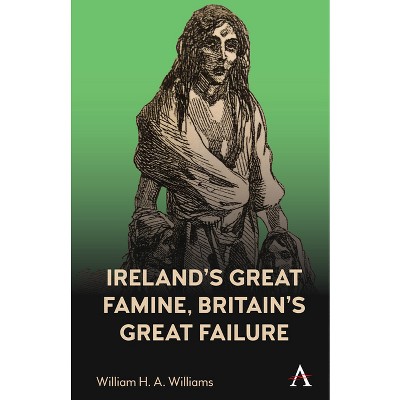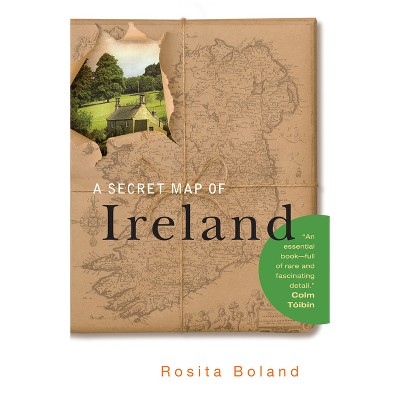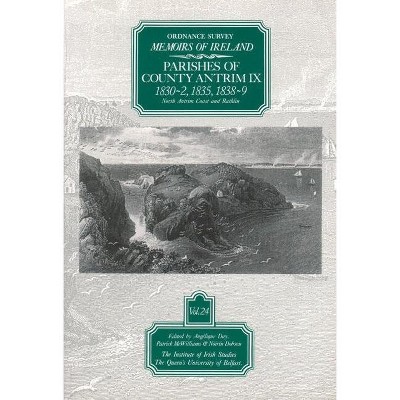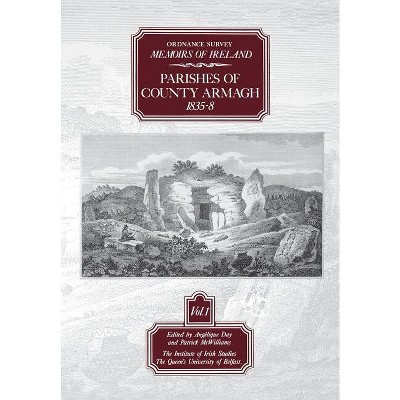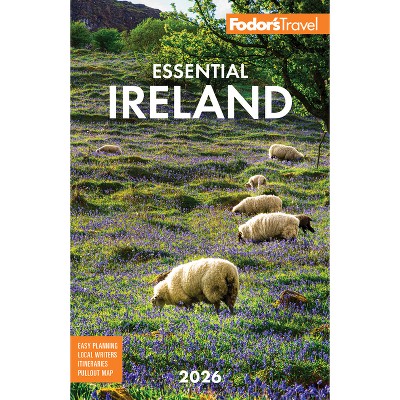Ireland's Great Famine in Irish-American History - by Mary Kelly (Paperback)

$48.00 when purchased online
Target Online store #3991
About this item
Highlights
- Ireland's Great Famine recasts traditional approaches to the Irish experience in America in a striking new reading of the history.
- About the Author: Mary C. Kelly is a professor of Modern Irish and American Histories at Franklin Pierce University.
- 288 Pages
- History, Europe
Description
About the Book
Ireland's Great Famine recasts traditional approaches to the Irish experience in America in a striking new reading of the history. This is the first compact synthesis to place Ireland's Great Famine at the heart of the modern ethnic narrative, and to explore the Famine's Irish...Book Synopsis
Ireland's Great Famine recasts traditional approaches to the Irish experience in America in a striking new reading of the history. This is the first compact synthesis to place Ireland's Great Famine at the heart of the modern ethnic narrative, and to explore the Famine's Irish-American legacy as a key factor in its course.Review Quotes
Although the history of the Great Irish Famine itself may be familiar to scholars, research on how the Famine was remembered, misremembered, and forgotten has barely begun. In this pioneering and wide-ranging book, Mary Kelly makes a significant contribution to this project. Drawing on the insights of contemporary memory studies, as well as on her own deep knowledge of Irish American history, Kelly provides a roadmap to the complicated process by which the memory of the Famine shaped what it meant to be Irish in the United States.
Exhaustively researched and beautifully written, Mary Kelly's Ireland's Great Famine in Irish-American History is not just a recounting of historical events--in this case of Irish mass starvation and emigration. It is rather a subtle and compelling study of the powerful and culturally determinative influence of how those events were remembered and the legacy of that remembrance. The immigrant generation brought stories of the Great Hunger with them to America; successive generations recalled, retold and commemorated those stories, and shaped their ethnic identities around them. It is the case that the Irish went through a brief, self-inflicted bout of forgetfulness, only, and just recently, to be "restored to memory" and to Famine remembrance. Kelly's very fine book is a brilliant evocation of that process of remembering and forgetting and of the collective 'Irish post-traumatic (and post-colonial) stress disorder' that initiated and propelled it.
In a style that is both sensitive and straightforward, Mary C. Kelly proves beyond doubt that the urge to remember and commemorate the Great Irish Famine - despite concerted efforts to forget and deny it - has won the day. Drawing together an astonishing amount of evidence from Irish and Irish American sources, she compellingly convinces us that the "hushed and silenced" voices are no more and the tidewaters of Famine memory are a long way from cresting. Every page bristles with knowledge gleaned from a vast array of scholarship, which makes Ireland's Great Famine in Irish-American History the vade mecum to which scholars and students of 19th and 20th century Irish America will turn again and again for a comprehensive overview of the processes of Great Irish Famine remembrance.
In this provocative and interesting work on the great famine and Irish American memory Mary C. Kelly argues that charting the course of that great rupture is essential to understanding the evolution of Irish American identity since the late 1840s. Kelly makes a convincing case that the famine was experienced, reframed in nationalist oratory, then largely forgotten before, in the second half of the twentieth century, being reconstructed--or even constructed anew--as part of a 'mature ethnic identity.' Historians of Irish America will find much of interest here, as will scholars of ethnicity and memory. Throughout the book there is a productive comparison--and sometimes tension-- between Irish and Irish American memories of the famine, and Kelly raises interesting questions about the way that identity and broad geopolitical considerations are intertwined.
Ireland's Great Famine in Irish-American Historyis a fascinating and important study of how our perceptions of this epic tragedy have changed over time and why those changes matter. Those new to this story will learn a great deal from her thoughtful analysis, while experts in Irish studies will marvel at her exhaustive research and new insights.
Kelly examines Ireland's mid-19th-century potato famine, its consequences within the transatlantic community, and the long-term impact of this event on the Irish psyche in the US. She recounts with impressive detail the mind-set of the Irish American community concerning an Gorta Mór and its linkages to ethnic identity, sociocultural constructions of victimhood, and the difficult process of remembering and internalizing such a tragic event. Although commemoration of the famine eventually found a vast global audience by the late 20th century, the journey was not an easy one. It took well over a century for the offspring of Irish immigrants to the US to recognize and understand the trauma wrought by the potato blight. Feelings of discomfort drove successful second- and third-generation Irish Americans to experience a form of historic amnesia when it came to their ancestors' troubled past. Kelly shows the complex evolution associated with public memory and trauma and the ways political and cultural rhetoric framed this debate. Meticulously researched, the book succeeds in capturing a fresh perspective on a complicated topic. Summing Up: Recommended. Graduate students and researchers/faculty.
Kelly shows how a necessary suppression of the shocking impetus for post-1840s Irish emigration facilitated the transition from hated Papists to acceptable white ethnic grouping. She deploys disparate sources to suggest how this holocaust throbs silently under the loud St. Patrick's Day celebrations that appear to denote ethnic success. Kelly is a diviner able to track underground memory currents and to uncover testimony in the lacunae. She marries the instincts of a novelist with the rigor of the historian, a rare ability that will make Ireland's Great Famine in Irish-American History a work of enduring importance to scholars and general readers from a wide spectrum of disciplines and interests.
Mary Kelly tells the crucial, fascinating story of how and why the Irish in the United States first experienced, later 'forgot, ' and in recent decades 'recovered' in memory the horror of the Great Famine of 1845-52--the tragic, foundational event of Irish-American history.
Mary Kelly's Ireland's Great Famine in Irish-American History is a groundbreaking work of investigative scholarship. As well as offer important insights into the continuing evolution of the Irish-American identity, Kelly chronicles the human struggle to make sense of a past that, though painful to possess, is impossible to escape. In terms of ethnic history in general and Irish-American history in particular, this book is a milestone.
About the Author
Mary C. Kelly is a professor of Modern Irish and American Histories at Franklin Pierce University. She is the author of The Shamrock and the Lily: The New York Irish and the Creation of a Transatlantic Identity (Peter Lang Publishing, 2005).Dimensions (Overall): 9.3 Inches (H) x 6.3 Inches (W) x .9 Inches (D)
Weight: 1.1 Pounds
Suggested Age: 22 Years and Up
Number of Pages: 288
Genre: History
Sub-Genre: Europe
Publisher: Rowman & Littlefield Publishers
Theme: Ireland
Format: Paperback
Author: Mary Kelly
Language: English
Street Date: September 16, 2016
TCIN: 1004201420
UPC: 9781442277809
Item Number (DPCI): 247-28-3627
Origin: Made in the USA or Imported
If the item details above aren’t accurate or complete, we want to know about it.
Shipping details
Estimated ship dimensions: 0.9 inches length x 6.3 inches width x 9.3 inches height
Estimated ship weight: 1.1 pounds
We regret that this item cannot be shipped to PO Boxes.
This item cannot be shipped to the following locations: American Samoa (see also separate entry under AS), Guam (see also separate entry under GU), Northern Mariana Islands, Puerto Rico (see also separate entry under PR), United States Minor Outlying Islands, Virgin Islands, U.S., APO/FPO
Return details
This item can be returned to any Target store or Target.com.
This item must be returned within 90 days of the date it was purchased in store, shipped, delivered by a Shipt shopper, or made ready for pickup.
See the return policy for complete information.
Trending Non-Fiction


$14.20
MSRP $27.00
Buy 1, get 1 50% off select books, games & more
4.8 out of 5 stars with 554 ratings

$22.40
Buy 1, get 1 50% off select books, games & more
5 out of 5 stars with 3 ratings

$12.54
MSRP $22.00
Buy 1, get 1 50% off select books, games & more
4.6 out of 5 stars with 14 ratings

$20.18
was $24.50 New lower price
Buy 1, get 1 50% off select books, games & more
5 out of 5 stars with 10 ratings

$10.99
MSRP $19.99
Buy 1, get 1 50% off select books, games & more
4.9 out of 5 stars with 287 ratings
